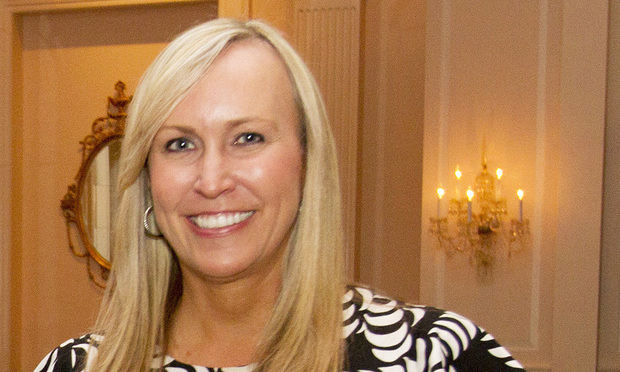Outgoing GTLA President Laurie Speed: Lobbying 'Very Similar to Talking to a Jury'
Laurie Speed of Speed & King handed off the Georgia Trial Lawyers Association gavel Friday night at the president's gala to the new leader, Daniel Snipes of Statesboro.
April 30, 2019 at 05:35 PM
4 minute read
 Laurie Speed of Speed & King (Photo: John Disney/ALM)
Laurie Speed of Speed & King (Photo: John Disney/ALM)
While the Georgia General Assembly put high-profile energy into passing a six-week abortion ban this year, the Georgia Trial Lawyers Association leaders took note in their annual meeting last weekend of what the legislators did not pass: mainly measures to limit the medical damages in civil litigation, outgoing president Laurie Speed told the Daily Report in an interview looking back on her one-year term.
Tort reformers had a “behind-the-scenes presence” at the Capitol this year, Speed said. And the trial lawyers stepped up their lobbying presence.
“Historically, we've had hands-off officers who come to meetings,” Speed said. “All my officers were all hands on deck.”
Speed said the GTLA Executive Committee meets monthly but, leading up the election last fall, the officers and legislative team had weekly calls. During the legislation session, they spoke almost daily.
“We were meeting on the phone and at the Capitol,” Speed said. “These are people who have full-time practices and who are trying cases. Meanwhile, they are committed to the civil justice system and willing to put their own practices on hold to make sure we have a voice at the Capitol and that bad laws are not passed. I think it's what makes trial lawyers different. This isn't a job for us. Call it a passion or a calling? The leaders of GTLA cannot turn a blind eye to politics just so they could focus on their own cases.”
As president of the 2,000-member, statewide trial lawyers' group, Speed said her job was simple in a way. “We're a one-issue organization,” she said. “We're focused on protecting the right to trial by jury.” Still, she said she felt more like the “arms and legs” of the organization than a figurehead.
The group offers continuing legal education as part of its member services. And its members fund what they say is the state's biggest political action committee.
Speed said leading the group was a different experience from her service as president of the Georgia Association of Women Lawyers in 2004 and 2005, although consensus-building was certainly part of that. But, she said, “I did not have the political and legislative exposures that I did here.”
What she learned, she said, was to use her experience as a trial lawyer in a new arena.
“Legislative lobbying is very similar to talking to a jury. You have a short time to educate and present a reasonable, rational explanation of your 'case.' If you overreach, you not only will not convince the person … to vote with you, but you also lose credibility going forward,” she said.
Speed handed off the gavel Friday night at the president's gala to the new leader, Daniel Snipes of Taulbee, Rushing, Snipes, Marsh & Hodgin of Statesboro. Speed will continue to serve on the executive committee for one more year as immediate past president. And she will return her focus to her firm, Speed & King.
Speed and Michelle King started the firm two years ago after leaving Shamp, Speed, Jordan, Woodward. Speed & King is a litigation boutique specializing in personal injury and medical malpractice.
Ironically, the big news bill that the Legislature did pass this year may result in new business for medical malpractice trial lawyers like Speed, if it is enacted.
“We cannot recover for the wrongful death of a fetus if it's not 18-20 weeks,” Speed said. That's the point of movement, called quickening. She said she's had to turn down potential medical malpractice cases in the past on that basis.
That could change, if Gov. Brian Kemp signs the legislation banning abortion after six weeks of pregnancy into law and if it survives a certain legal challenge in federal court. Backers of similar legislation around the country call them “heartbeat bills” because they are based on the point at which a pulsing sound can be detected by a doctor on a transvaginal ultrasound. But the authoring legislators of the Georgia legislation added a personhood stipulation that gives the fetus legal status as a tax deduction and a child-support claim, calculating that would add to the chances of the U.S. Supreme Court overturning Roe v. Wade. That landmark decision holds that women have the right to choose abortion until a fetus can survive after birth.
“That would open up wrongful death cases at six weeks,” Speed said. “I don't think that was their intention.”
This content has been archived. It is available through our partners, LexisNexis® and Bloomberg Law.
To view this content, please continue to their sites.
Not a Lexis Subscriber?
Subscribe Now
Not a Bloomberg Law Subscriber?
Subscribe Now
NOT FOR REPRINT
© 2025 ALM Global, LLC, All Rights Reserved. Request academic re-use from www.copyright.com. All other uses, submit a request to [email protected]. For more information visit Asset & Logo Licensing.
You Might Like
View All
Why Georgia's Latest Push to Curb Lawsuits Has Business Groups and Trial Lawyers at Odds
6 minute read
Justice Department Enters Consent Decree With Fulton County Over Jail Conditions
6 minute read
Trending Stories
- 1SDNY US Attorney Damian Williams Lands at Paul Weiss
- 2Litigators of the Week: A Knockout Blow to Latest FCC Net Neutrality Rules After ‘Loper Bright’
- 3Litigator of the Week Runners-Up and Shout-Outs
- 4Norton Rose Sues South Africa Government Over Ethnicity Score System
- 5KMPG Wants to Provide Legal Services in the US. Now All Eyes Are on Their Big Four Peers
Who Got The Work
Michael G. Bongiorno, Andrew Scott Dulberg and Elizabeth E. Driscoll from Wilmer Cutler Pickering Hale and Dorr have stepped in to represent Symbotic Inc., an A.I.-enabled technology platform that focuses on increasing supply chain efficiency, and other defendants in a pending shareholder derivative lawsuit. The case, filed Oct. 2 in Massachusetts District Court by the Brown Law Firm on behalf of Stephen Austen, accuses certain officers and directors of misleading investors in regard to Symbotic's potential for margin growth by failing to disclose that the company was not equipped to timely deploy its systems or manage expenses through project delays. The case, assigned to U.S. District Judge Nathaniel M. Gorton, is 1:24-cv-12522, Austen v. Cohen et al.
Who Got The Work
Edmund Polubinski and Marie Killmond of Davis Polk & Wardwell have entered appearances for data platform software development company MongoDB and other defendants in a pending shareholder derivative lawsuit. The action, filed Oct. 7 in New York Southern District Court by the Brown Law Firm, accuses the company's directors and/or officers of falsely expressing confidence in the company’s restructuring of its sales incentive plan and downplaying the severity of decreases in its upfront commitments. The case is 1:24-cv-07594, Roy v. Ittycheria et al.
Who Got The Work
Amy O. Bruchs and Kurt F. Ellison of Michael Best & Friedrich have entered appearances for Epic Systems Corp. in a pending employment discrimination lawsuit. The suit was filed Sept. 7 in Wisconsin Western District Court by Levine Eisberner LLC and Siri & Glimstad on behalf of a project manager who claims that he was wrongfully terminated after applying for a religious exemption to the defendant's COVID-19 vaccine mandate. The case, assigned to U.S. Magistrate Judge Anita Marie Boor, is 3:24-cv-00630, Secker, Nathan v. Epic Systems Corporation.
Who Got The Work
David X. Sullivan, Thomas J. Finn and Gregory A. Hall from McCarter & English have entered appearances for Sunrun Installation Services in a pending civil rights lawsuit. The complaint was filed Sept. 4 in Connecticut District Court by attorney Robert M. Berke on behalf of former employee George Edward Steins, who was arrested and charged with employing an unregistered home improvement salesperson. The complaint alleges that had Sunrun informed the Connecticut Department of Consumer Protection that the plaintiff's employment had ended in 2017 and that he no longer held Sunrun's home improvement contractor license, he would not have been hit with charges, which were dismissed in May 2024. The case, assigned to U.S. District Judge Jeffrey A. Meyer, is 3:24-cv-01423, Steins v. Sunrun, Inc. et al.
Who Got The Work
Greenberg Traurig shareholder Joshua L. Raskin has entered an appearance for boohoo.com UK Ltd. in a pending patent infringement lawsuit. The suit, filed Sept. 3 in Texas Eastern District Court by Rozier Hardt McDonough on behalf of Alto Dynamics, asserts five patents related to an online shopping platform. The case, assigned to U.S. District Judge Rodney Gilstrap, is 2:24-cv-00719, Alto Dynamics, LLC v. boohoo.com UK Limited.
Featured Firms
Law Offices of Gary Martin Hays & Associates, P.C.
(470) 294-1674
Law Offices of Mark E. Salomone
(857) 444-6468
Smith & Hassler
(713) 739-1250







